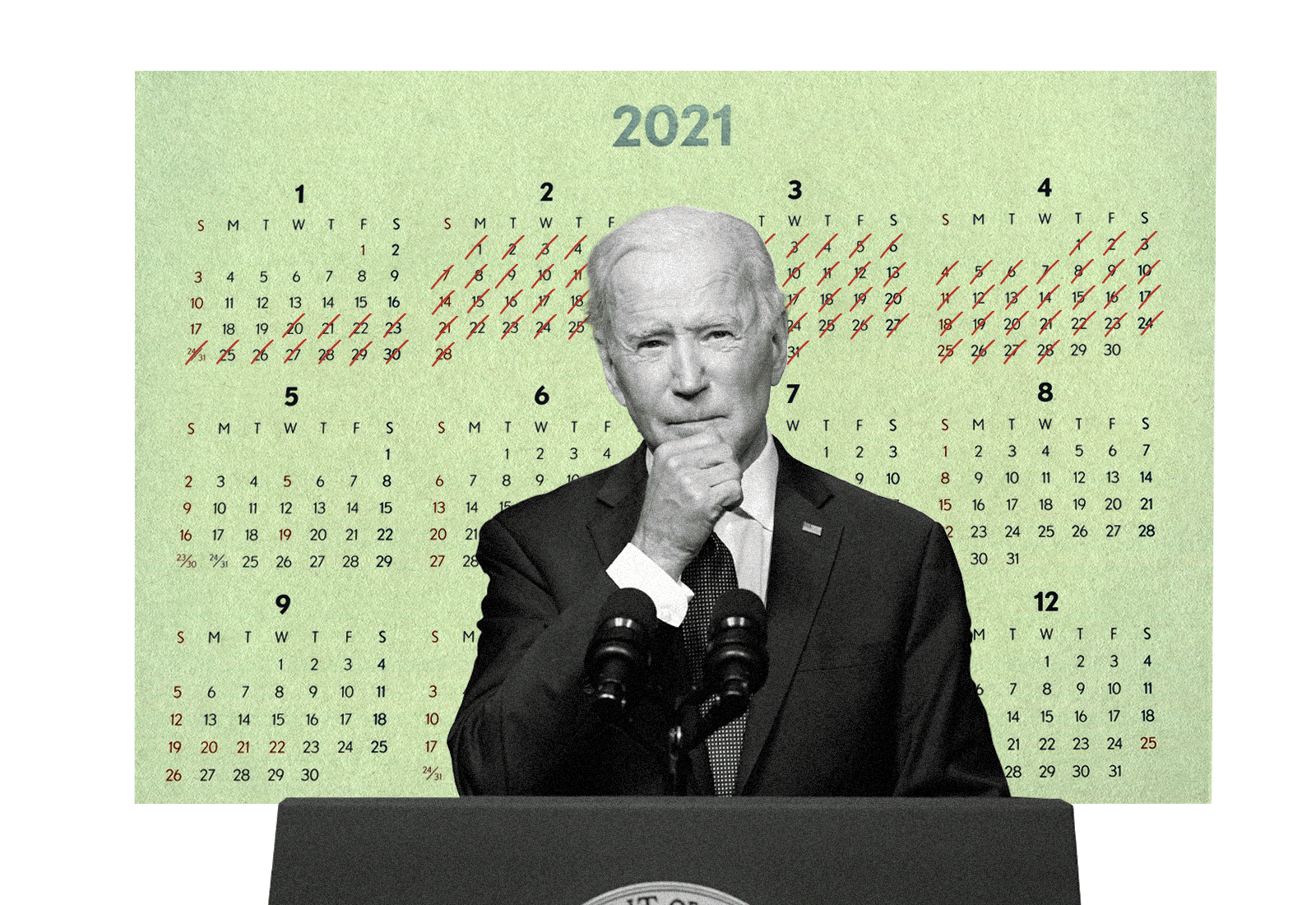During the final debate of the 2020 election, President Joe Biden did something unheard of for a major presidential candidate: He vowed to end the use of fossil fuels. “I would transition from the oil industry,” Biden said, in response to a pointed question from then-President Donald Trump. “It has to be replaced by renewable energy over time.”
It was a sharp rebuke of the oil, gas, and coal sector, and one that did not go unnoticed by Biden’s political rivals. (The Democratic candidate later claimed he was talking only about transitioning away from fossil fuel subsidies.) Greg Abbott, the Republican governor of Texas, tweeted that Biden’s promise amounted to a “transition away from Texas”; Trump himself argued that Biden would “destroy the oil industry.”
Now, 100 days into his presidency, Biden has accomplished many of his climate promises — he has rejoined the Paris Agreement, hosted a world summit on climate change, announced a new goal of lowering U.S. emissions by 50 percent by 2030, and laid out plans for a $2 trillion infrastructure bill that is actually (quietly) a climate bill. But has the president followed through on his plans to “hold polluters accountable” at home? Let’s take a look at Biden’s record on four major ways the federal government can cut down on fossil fuels.
Shutting down oil pipelines
On pipelines, Biden came out swinging by revoking a key permit for the Keystone XL pipeline, which would have transported oil from Canada’s tar sands to Nebraska. In an executive order signed on day one of his presidency, Biden wrote that an Obama-era review of the project concluded the pipeline “would undermine U.S. climate leadership” and also pointed to the “urgency for combating climate change.”
But the administration has been relatively silent on other pipeline battles raging around the country, including over the Dakota Access Pipeline and the Line 3 pipeline expansion through Minnesota.
At a hearing earlier this month, the Biden administration had an opportunity to halt construction of the Dakota Access Pipeline, since the companies overseeing the project are operating without a federal permit. But an attorney from the Department of Justice declined to do so, telling a federal judge that the Army Corps of Engineers is still gathering information. “They actually had a very clear opportunity to take action and did not,” said Collin Rees, a senior campaigner for Oil Change International. “That’s been very disappointing.”
The only hint that the administration might have more of a fight in store for pipeline operators came from an interview with Energy Secretary Jennifer Granholm during a recent CNN town hall. In response to a question about the government’s stance on the Line 3 pipeline, another Canadian tar sands project that Indigenous and climate activists are begging Biden to shut down, Granholm said she believed it was “under review,” adding that she thought there was “great sensitivity to the Indigenous peoples who will be affected by it.”
Ending subsidies for fossil fuels
According to estimates from Oil Change International and the bipartisan Environmental and Energy Study Institute, the U.S. government pours about $20 billion a year into tax breaks, subsidies, and direct support for coal, oil, and gas. Biden has repeatedly promised to end that financial support, saying, “I don’t think the federal government should give handouts to Big Oil.”
But fossil fuel subsidies are tricky to root out — they are spread out across the entire government, and the president can only directly control subsidies that come from federal agencies, like the Department of Justice or the Department of Energy. Money that’s shelled out to Big Oil via the tax code will have to be cut off by Congress.
In an executive order on January 27, the president told the federal government to identify “any fossil fuel subsidies provided by their respective agencies” and then take steps to stop directly subsidizing fossil fuels. But that order did not come with a deadline, and so far the Biden administration hasn’t issued any updates on its progress.
On the Congressional side, a handful of Democratic members of the House have introduced legislation to end 11 of what they call the most “egregious” fossil fuel subsidies in the U.S. tax code, and Biden has also argued that eliminating fossil fuel subsidies could help pay for his $2 trillion infrastructure plan. But such a bill would still have to make its way through Congress — and the Democrats’ razor-thin majority in the Senate isn’t going to make it easy.
Source: Grist Clayton Aldern / Grist
Banning new oil and gas leasing on public lands
Biden seems to have lost his spine when it comes to a campaign promise he made to ban new oil and gas leases on public lands. Although he put a temporary moratorium on new drilling leases during his second week in office while the Department of Interior conducts a review of the leasing program, there’s been no indication the administration intends to make the ban permanent. To the contrary, Interior Secretary Deb Haaland has stressed that it is temporary.
The review could result in a few different outcomes. Some experts are advocating for reforms of the leasing program, which frequently sells off drilling rights for less than $2 dollars per acre, allows companies to sit on leases for up to 10 years, and brings in only a fraction of the revenue in royalties that drilling on state or private lands require. Structural changes, reformists say, could deliver higher revenues to the government and protect the environment.
But others are ready to hold Biden accountable to his initial commitment, and more. A large coalition of environmental groups has asked the administration for a more comprehensive review that would look at how to align the entire oil and gas leasing program with Biden’s climate goals. Kyle Tisdel, climate and energy program director of the Western Environmental Law Center, said this could take several years but would result in more durable solutions that would outlast Biden’s term in office.
“What we’re calling for is an end to leasing,” said Tisdel, “and then a management of how we decline public lands oil and gas development in a way that’s consistent with carbon budgets and the science and the timeline of the crisis.” Otherwise, he warned, “you’re going to get this chaotic decline based on the market economics of oil and gas.”
Regulating polluters
Trump rolled back dozens of environmental regulations during his term in office, allowing more emissions to spew from power plants and car tailpipes. It could take years to overturn many of these, but Biden’s team is moving quickly on a few key regulations of planet-warming greenhouse gases.
The administration is cooking up new federal fuel-efficiency standards for cars and trucks, and is also planning to restore California’s right to set its own, stricter fuel standards, which are followed by 14 other states. This week, the Senate also used a little-known legislative loophole to overturn Trump-era regulations on methane, a super-potent greenhouse gas that leaks from oil and gas wells. If the House follows suit, that will revert limits on methane for the oil and gas industry to their much stricter Obama-era levels.
One of the most important climate regulations, however, will also be the trickiest to restore. Earlier this year, a court threw out Trump’s rules on emissions from coal- and gas-fired power plants, giving the Biden administration a clean slate to write new regulation. But former President Barack Obama’s attempt to regulate those same power plants — which account for about 25 percent of the U.S.’s total carbon emissions — ran into trouble in the courts when a group of Republican-controlled states argued that it was an overreach of federal authority. Michael Regan, the administrator of the Environmental Protection Agency, has said that the agency is working on new rules, but it will have to be careful to avoid falling into the same legal traps faced by the Obama administration.
In the long run, these regulations could do even more to slow down the fossil fuel industry than stopping pipelines or canceling subsidies. “What’s threatening to oil and gas is really the actions that are being planned on the power sector and the transportation front,” said Andrew Logan, senior director of oil and gas at the sustainable finance nonprofit Ceres.



